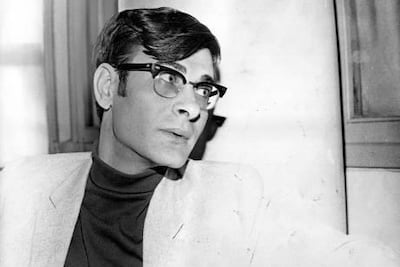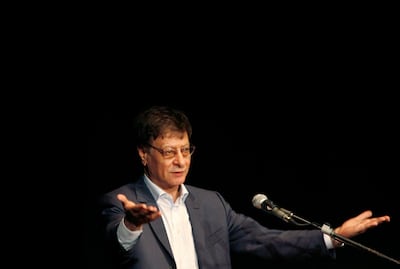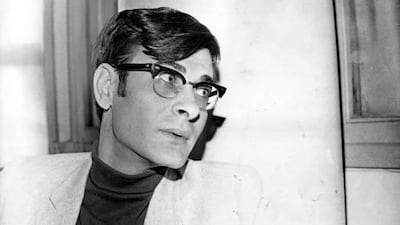There will be scores of articles published today celebrating the life and work of Mahmoud Darwish, who died 10 years ago in Houston, Texas, following complications that resulted from open-heart surgery. Darwish is hailed as Palestine's national poet, a writer who did more than any other to create a Palestinian national consciousness through his work. Both the influence and admiration of his work have only grown since his death, in large part due to translations of his poetry into English and other languages, and the myriad ways he has inspired other artists in their creative work.
A poet that filled stadiums when he read
In describing Darwish's legacy and greatness, Ahdaf Soueif, an award-winning British-Egyptian novelist and writer, told The National: "Mahmoud Darwish is simply a great poet. He has the poet's god-given ability to use language to trigger new perceptions and to create the aesthetic fusion that hits the listener or reader's heart and mind at the same time.
“Add to this that he was Palestinian at a time when Palestine was ‘the cause’ for every native speaker of Arabic, and that he was committed to that cause and fought for it, that he was modest, and charismatic, and you have a superstar. Darwish filled stadiums when he read. You cannot overstate his legacy.”
Born in 1941 in a village in what is today Israel, he witnessed, and was often a part of, seminal chapters in the history of Palestine throughout the 20th century and the start of the 21st century. He was a refugee, revolutionary, nationalist, humanist – all chronicled in his poetry.
The writer 'has to resist'
In 2008, Darwish was the first writer approached by Soueif and other members of the Board of the Palestine Festival of Literature (PalFest) to be one of the festival’s founding patrons. He accepted.
Darwish was due to participate in the inaugural festival but had to decline due to health issues. His address was a letter welcoming the group of international writers who had travelled to Palestine for the festival, and thanking them for their solidarity. Three months later, he was being laid to rest in Ramallah.
“Darwish was 100 per cent artist, he was also 100 per cent engaged with the struggle for liberation,” says Soueif by email. “In his address to PalFest in 2008, Darwish described his personal task: how the poet ‘has to use the word to resist the military occupation. And has to resist – on behalf of the word – the danger of the banal and the repetitive.’ It’s tremendously touching as well as instructive to read his work with an awareness of that constant struggle to make his work serve his cause and, at the same time, to allow his work to be true to itself, and to create a bit of space for the ‘literariness’ of his poetry.”

A very bleak decade for Palestinians has passed since his death – three deadly and destructive military assaults by Israel on the captive population in Gaza; a decade of de-development in Gaza, exercised by Israel and Egypt through the continuing blockade, precipitating an imminent humanitarian catastrophe; the ongoing colonisation of Palestine; Trump’s official recognition of Jerusalem as the capital of Israel; more than 150 Gazans killed and 16,000 injured by Israeli snipers in recent months during the Great March of Return; the nation state law passed last month by the legislature of Israel – not to mention Palestinian factional divisions and much more.
His final words are still urgent 10 years on
His letter to PalFest before he died is a sobering but inspiring and urgent message to fellow international writers. The importance, honesty and power of these words resonate today more strongly than ever.
"Your courageous visit of solidarity is more than just a passing greeting to a people deprived of freedom and of a normal life; it is an expression of what Palestine has come to mean to the living human conscience that you represent. It is an expression of the writer's awareness of his role: a role directly engaged with issues of justice and freedom. The search for truth, which is one of a writer's duties, takes on – in this land – the form of a confrontation with the lies and the usurpation that besiege Palestine's contemporary history; with the attempts to erase our people from the memory of history and from the map of this place.

“Dear friends, in your visit here you will see the naked truth. Yesterday, we celebrated the end of apartheid in South Africa. Today, you see apartheid blossoming here most efficiently.”
Palestine continues to be an issue that many international artists shy away from because they feel they don’t know the facts and are afraid to be accused of anti-Semitism. Anyone following the implosion of the Labour Party in the United Kingdom over anti-Semitism claims will understand the effectiveness of this tactic to silence critics of Israel.
As Israel entrenches its colonisation and cracks down on human rights activists and civil liberties, Soueif says that she sees hope in the growing boycott, divestment and sanctions (BDS) movement set up by Palestinian civil society.
____________________
Read more:
The hefty price of expression in Palestine
First Palestinian art museum in US opens its doors
From Palestine to America: Taysir Batniji's exhibition shows journey to American dream
____________________
“I hope that one of the things that will result from escalating Israeli extremism is that the BDS movement will grow stronger and stronger, as it seems to be the only non-violent route to a just solution for Palestine-Israel. I’m much heartened particularly by the work that young American Jews like ‘If Not Now’ are doing.”
In closing, Darwish told attendees visiting Palestine, “Know that we are still here; that we still live”, and enjoins them to incorporate his vision into their work, alongside Palestinian writers. “A literature born of a defined reality is able to create a reality that transcends reality – an alternative, imagined reality. Not a search for a myth of happiness to flee from a brutal history, but an attempt to make history less mythological, to place the myth in its proper, metaphorical place, and to transform us from victims of history, into partners in humanising history.”
Ten years on, Darwish’s legacy is out of his hands – and in the hands of those who have inherited his words.

